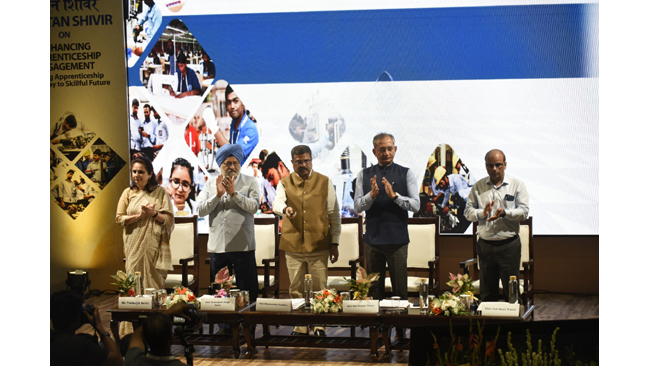
New Delhi, August, 2023.
To bolster the participation of both industries and young individuals in apprenticeship training on a nationwide scale, Shri Dharmendra Pradhan, Union Minister for Education and Skill Development & Entrepreneurship launched Direct Benefit Transfer (DBT) in National Apprenticeship Promotion Scheme (NAPS). An amount of approx. 15 crores was disbursed to one lakh apprentice by the Minister marking the launch of DBT in NAPS.
A total of 25 lakh youth have been engaged as apprentices since
the inception of inception National Apprenticeship Promotion Scheme in 2016,
till 31st July 2023. Around 2.6 lakh Apprentices have completed training
in FY 23-24.
The
Government of India’s proactive efforts to promote quality training across
sectors, led tothe number of
active establishments subsequently increase from 6,755 in 2018-19 to 40,655 in
2023-24.
Lauding
the initiative, Shri Dharmendra Pradhan said that it is a momentous day towards
invigorating the apprenticeship ecosystem in our country. Launch of DBT in
National Apprenticeship Promotion Scheme is a big step towards fulfilling our
Prime Minister Shri Narendra Modi’s vision of making skilling an apprenticeship
aspirational as well as encouraging earning while learning as envisioned in
NEP. He congratulated all the 1 lakh apprentices who have received stipend
through DBT.
Shri
Atul Kumar Tiwari, Secretary, Ministry of Skill Development &
Entrepreneurship said that empowering our nation's youth with skills is at the
heart of our vision, and the introduction of Direct Benefit Transfer (DBT)
through NAPS marks a stride towards transparency and efficiency. A skilled
workforce is paramount, and our multifaceted strategy, encompassing policy
evolution, industry synergies, and heightened recognition. In harmony with
India's core values of inclusivity and diversity, the Chintan Shivir on
Apprenticeship underscores a crucial mission. Together, we forge ahead to craft
a future where every individual's potential finds its truest expression, he
added.
Shri Dharmendra Pradhan interacted with some of the vibrant industry clusters and enthusiastic apprentices across Maharashtra, Telangana, Himachal Pradesh, Kerala, Haryana, Uttar Pradesh. There has been more 488% increase in number of establishments who have started apprenticeship training since the commencement of NAPS. This increased adoption of apprenticeship training will strengthen our nation's workforce and economy. Some of them were Mahratta Chamber of Commerce, Industries and Agriculture (MCCIA), Baddi Cluster from Himachal Pradesh and North Malabar Consortium Industry cluster
The
MSDE also organized the Chintan Shivir on “Enhancing
Apprenticeship Engagement” to elevate
the uptake of apprenticeship programs among all stakeholders. A core
facet of this session is to amplify the role and responsibility of various
entities, including other central and state governments, industry bodies, and
the private sector.
The
Chintan Shivir was divided in three breakout sessions themed on Stakeholder
Convergences to Make Apprenticeship Aspirational, Strategies and Practices to
promote Quality Apprenticeship, and Creating a Diverse and Inclusive
Apprenticeship Ecosystem, respectively.
These
sessions were co-chaired by SmtSonal Mishra, Joint Secretary, MSDE, Additional
Secretary, MSDE and Smt, Soumya Gupta, Joint Secretary,MoE MSDE; Trishaljit
Sethi, Additional Secretary, Director General, DGT, MSDE and Shri Ved Mani
Tiwari, CEO, NSDC and MD, NSDC International; Shri. Nilambuj Sharan, Senior
Economic Adviser, MSDE and Smt. Heena Usman, Joint Secretary, MSDE.
The deliberations were centered around:
o
Fostering dialogue exchange on apprenticeship
o
Increase uptake of apprenticeship
o
Quality enhancement
o
Necessity of equal opportunities for all, including
marginalized, unserved, and underserved communities from various backgrounds
and geographies.
The key achievements of National
Apprenticeship Promotion Scheme (NAPS) include:
·
In
FY 2023-24, approximately 2.6 lakh apprentices have successfully completed
their training.
·
Women apprentices have also increased from
22,427 in 2018-19 to 1.48 lakh in FY 2022-23, registering a nearly 7 fold
increase in last five years.
·
The
number of active establishments has subsequently increased from 6,755 in
2018-19 to 40,655 in 2023-24.
·
In
2022-2023: We have trained 4.80 lakh apprentices in Optional Trades while we in
DT we have trained 2.58 lakh apprentices.
·
We
witness states like Gujarat, Maharashtra, Haryana, Uttar Pradesh, Tamil Nadu,
Karnataka, Telangana topping the apprenticeship engagement chart
·
More
than 9 lakh youth who are apprentices are in the age group of 23-26
·
There
are takers right from 5-8thpassout to Graduate, Post Graduate and
Certificate holders who have opted for apprenticeship training
·
Our
last mile impact has reached out to North Eastern Region, to aspirational
districts and tribal districts
·
To
create awareness about Apprenticeship we have held Pradhan Mantri National
Apprenticeship Melas and Kaushal Mahotsav and industry cluster workshops at a
large scale across the country
·
There
is participation from Industrial Corridors, Industrial Parks, Chamber of
Commerce, Private sector banks, Large CA Firms, Sector Skills Councils and
Industry clusters in boosting apprenticeship training
With the implementation of NAPS, the
Government of India reimburses 25% of the prescribed stipend — subject to a
maximum of Rs. 1500/- per month per apprentice — that all employers undertake
by engaging apprentices. With the implementation of NAPS, it has been noted
that not all establishments seek partial reimbursement of stipend by the
Government. Going by past trends, 30% of
target apprentices, under NAPS 2.0, will be paid their stipend by Government of
India. With the implementation of DBT, the number of apprentices is expected to
increase. Accordingly, the percentage of apprentices covered will be going up
beyond 30%.